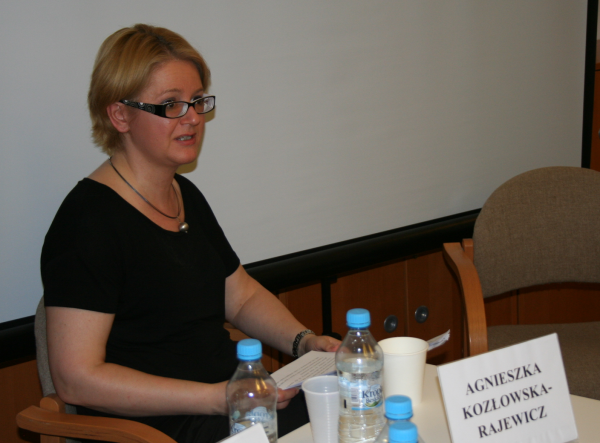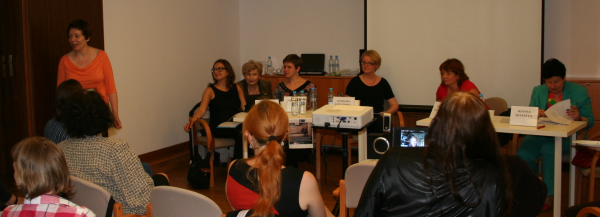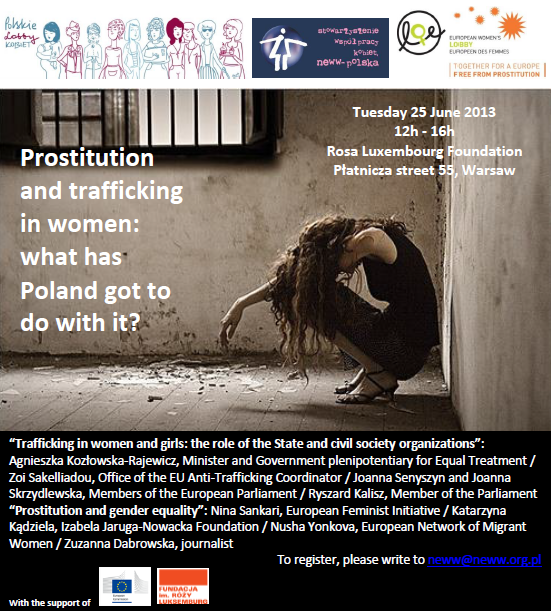Polish Women’s Lobby launches national debate on prostitution and trafficking in women and girls

[Warsaw, 25 June 2013] By organizing a conference entitled “Prostitution and trafficking in women: what has Poland got to do with it”, the Polish Women’s Lobby upped the momentum for a national debate on the issue of prostitution and its links with gender equality. Organised in the meeting room of the Rosa Luxembourg Foundation, in the framework of the European Women’s Lobby’s campaign “Together for a Europe free from prostitution”, the event brought together the Polish Minister for Equal Treatment, representatives of the European Commission and the European Parliament, academics, journalists and NGOs.
The conference plays an important role for a genuine debate on the issue of prostitution and trafficking to start in Poland, with all relevant stakeholders, including at European level. Indeed, as EWL Board member Malgorzata Tarasiewicz said in her introductory speech, the phenomenon of prostitution is not discussed in Poland and there seems to be high social acceptance for its pervasiveness. The phenomenon of “sponsorship”, visible in the recent developments in Poland with the Fibak case, is not questioned and even supported by the Polish personalities from the cultural, political and sport sectors. The reality of the situation experienced by women in prostitution is not considered as an issue, while some politicians seem to legitimate a double-standard situation where women in prostitution are not offered the same rights as Polish women. Moreover, while trafficking and prostitution are closely linked to migration, as pointed out by the frontline organisation La Strada, Poland does not seem to consider and implement concrete policies to protect migrant women from sexual exploitation.
Agnieszka Kozlowska-Rajewicz, Minister and Government plenipotentiary for Equal Treatment, recognized that trafficking in human beings is a gendered phenomenon, as 75% of victims in Poland are women and girls. In the EU, 96% of the victims of trafficking for sexual exploitation are women and girls, while the majority of suspected traffickers are men (see Eurostat). Poland is not only a country of origin when it comes to trafficking for sexual exploitation, but it is now also a country of transit and of destination, as the experience of the 2012 UEFA football cup showed. Moreover, as pointed out by Nina Sankari, from the European Feminist Initiative, the current austerity measures have a detrimental impact on women and lead to an increase of prostitution and at the same time of public revenues for Member States looking for solutions to reduce deficits and foster growth in a time of crisis. As Zoi Sakelliadou, from the office of the EU Anti-Trafficking Coordinator, said, one cannot ignore the links between the booming sex industry and trafficking in women and girls. The system of prostitution needs to be understood as a global market, producing benefits at the expense of the most vulnerable, that is women and girls, especially from poorer countries or minorities inside and outside the EU.
During the conference, the demand side of prostitution was addressed and acknowledged as a driver for trafficking in women and girls. In Poland, estimates tell us that escort agencies amount to 1000, while Europol statistics see a rise in demand in a context of economic crisis. In a video message (see below), the President of the European Network of Migrant Women Nusha Yonkova pointed out to the role of the demand, especially when it comes to the diversity of the “supply” with many sex buyers asking for “exotic” women and perpetuating racist stereotypes in their attitudes (see the blog ‘The invisible men’ which display the comments of sex buyers taken from prostitution websites).
The discussion with participants brought the usual arguments about prostitution: while everybody agrees that trafficking in women and girls is a crime, some want to see prostitution as a free choice from some women. As pointed out by MEP Joanna Senyszyn, it is important to better know the phenomenon. She signed the Brussels’ Call, which gathers more than 200 NGOs from all over Europe, many of them being frontline organisations supporting victims of prostitution and trafficking and informing the EWL and MEPs about the reality of prostitution and its intrinsic violence. EWL Policy Officer Pierrette Pape reminded participants that the discourse on human rights should not be reduced to individual decisions and wishes, but to a collective vision for society, in a context where we need to protect the most vulnerable and to address the links between prostitution and gender equality. She presented outcomes of studies on the impact of prostitution on society, both on women in prostitution, but also on young people and their perception of sexuality and equality (see her presentation here).
To conclude, the conference brought new food for thought about prostitution and trafficking in women in Poland. On the one hand, the European Commission identifies violence against women and gender inequality as factors contributing to the victimization and vulnerability of women to trafficking. On the other hand, the European Parliament lists prostitution amongst the various forms of violence against women. Even if the lack of data is an obstacle to gaining knowledge on the issue, the reality of prostitution and trafficking, as experienced by women’s and frontline organisations, shows that a debate is urgent in Poland to make sure that Polish policies are adequately understanding and tackling both phenomena.
To read the press release issued ahead of the conference, please click here.
Extract: “It is not surprising that the lack of EU and national policies on prostitution has led to an increase in procuring and fuels trafficking in women into Europe for sexual purposes and sex tourism”, explains Malgorzata Tarasiewicz, President of the Polish Women’s Lobby and EWL Board member. “In order to ambitiously tackle trafficking in women for sexual purposes, the EU and its Member States, including Poland, must firstly tackle procuring and the demand side of the phenomenon through awareness raising, education to equality and effective sanctions to prostitute-users and procurers.”
Click here to download the programme.
Press coverage in Polish:
Uczestnicy debaty: karanie klientów sposobem na walk? z prostytucj?, Gazeta
Agnieszka Kozlowska-Rajewicz, Minister and Government plenipotentiary for Equal Treatment

Rosa Luxembourg Foundation, Zoi Sakelliadou, Pierrette Pape, Minister Agnieszka Kozlowska-Rajewicz, MEP Joanna Senyszyn

Video message of Nusha Yonkova, President of the European Network of Migrant Women





